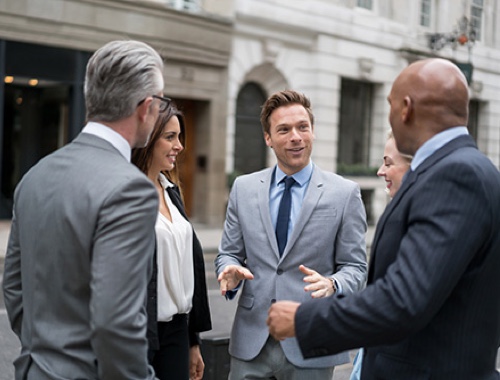
From CNN to Podcasting: Bill's Transition to a More Intimate Medium With Bill Tucker and Royal Standley
In this episode, Royal Standley interviews the latest addition to his podcast, Bill Tucker, a podcast producer with Proudmouth and an award-winning reporter. Bill shares his extensive background in the media industry, including his career in radio and his transition to working as a producer for CNN's business news division, along with his time as a commodity broker and shares insights about trading and risk tolerance.
Episode 85 Transcript
Intro: Royal Standley of Oregon Pacific Financial Advisors, offering securities through United Planners Financial Services, member FINRA SIPC, guides clients with empathy in discovering and reaching their financial goals and creates financial plans for clients so they can live their lives by design. In these episodes, he relates his financial insights and discusses timely topics.
Royal strives for excellence and has a passion for sharing his knowledge and supporting his community. Now onto the show.
Aric Johnson: Hey, Royal, how you been?
Royal Standley: I'm good. How are you doing Aric?
Aric: I'm fantastic. I'm so excited to get into today's podcast, but you are in a highly regulated industry.
Royal: Yes, I am.
Aric: And because of that, sometimes we have a disclosure that needs to be read.
So let's do it.
Royal: All right. Here's the disclosure for today. Discussions in this show are for educational purposes only. Information presented should not be considered specific investment advice or a recommendation to take any particular course of action. Always consult with a financial professional regarding your personal situation before making any financial decisions.
The views and opinions expressed are based on current economic and market conditions and are subject to change. All investing involves risk. Including the potential for loss of principle securities offered through United Planners Financial Services member FINRA, S I P C advisory service offered through Oregon Pacific Financial Advisors, Inc.
Oregon Pacific Financial Advisors and United Planners are independent companies, and neither Oregon Pacific Financial Advisors nor United Planners offers tax or legal advice. Okay, now that we've taken our medicine, can we get on with the show? Let's go welcome to the life by design podcast with Royal Standley.
Bill Tucker: Good day. Good to see you.
Royal Standley: Good to see you, Bill. I'm excited to have you here today. So as listeners know, uh, this is your new voice here joining the pod.
Bill: I was going to say, I'm clearly not Aric to all the people who've been listening for many years to you, but it's great to be here with you.
Royal: And you know, we're excited to have you join the team here and really looking forward to today because I just wanted to take today and learn, you know, more about you, Aric, you know, shared your resume with me and we got a chance to chat a little bit before this, but I thought it'd just be fun to get, get on the microphone and just, just talk about some of your history, your, your perspectives and where you're coming from.
Bill: Uh, all right. Okay. I'm fair game. I'm fair game. Let's do it.
Royal: Excellent. Excellent. So, so Bill, you have a pretty extensive, uh, resume of working in various parts of the media. Um, how do you describe your career?
Bill: I describe my career as, uh, an unexpected blessing because I look at my career and I, um, I, you know, looking back on it, I am, it, I'm kind of stunned. I don't know how a guy who came from the meager beginnings that I came from ended up having what by any measure was a very successful career and a career doing something I have really, really just enjoyed for every minute of it. And, um, Yeah, I, I've been very fortunate. I've been very fortunate. I've worked with some really good people.
I've, uh, as you know, from looking at my resume, have been, uh, privileged to, uh, earn a couple of prestigious awards. I won a George Foster Peabody for work that I did in production. And, um, I've also was a three time Emmy nominee and won an Emmy as a reporter in front of the camera. So it's been, it's been a fun and interesting career, Royal.
Royal: Well, well, I'm looking forward to diving in a little bit here. Tell us a little bit about how you grew up and, you know, how you started to break into, you know, it sounds like the arts and media.
Bill: Well, it's interesting. And on my, as I tell people all the time, I, let's start with where I grew up. I grew up, I was born in the South and grew up in the South and was raised primarily in Texas.
When I was in high school, I got into radio because I needed to pick up some part time work. And a friend of mine had worked at the radio station. So I tell people all the time, my career actually in media began in high school in radio. And, uh, it's interesting that I've come back around to audio here at this part of my career.
But it gives it a nice certain sort of beautiful symmetry that I, that I, I really like. Um, I worked in radio, had a great time. I worked in FM radio, which was the early days where I went and like anything Royal, I mean, you know, you could talk for three hours, you could play a song that went on for 45 minutes.
Nobody complained, nobody cared. Um, and it was fun, but I used to do rock music like Wednesday night, Thursday night, Friday night, and Saturday night. So I was the nighttime guy I would then, the radio station went off the air. Two in the morning and we would come back on at six in the morning. So Saturday night I would wrap up my rock show. I would go home, I would turn around and I would come back in to the radio station on Sunday mornings and go from rock to gospel music. Had a guy from McKinney, Texas who would come in with a big stack of, uh, albums and I was his engineer as it were and he would come in and for two hours we did nothing but country gospel music and it was, uh, it was, uh, it was a lot of fun.
I learned a lot because he was a he was a terrific gentleman. He was, he was so great. And, uh, my worst nightmare was when Sunday he came in and he goes, you know, Bill, I was listening to your show last night and I'm thinking, Oh, Lord, it's a little different than, than what we do on Sunday mornings. I was like, sure is.
All: [Laughter]
Bill: I hope you didn't mind. He goes, no, no, no, that's fine. I really enjoy spending time with you. And we went on and had a, did the show.
Interestingly, Royal, I do volunteer work at a nonprofit local. FM radio station about five miles from my house, and I've been conversations with them talking about symmetry and cyclical things about doing a one hour gospel radio for them.
So, he goes to McKinney, lives on, as it were.
Royal: That is wonderful. That is wonderful. So, uh, so raised in Texas. My father grew up there, grew up in Texas. Uh, what part of Texas?
Bill: Northeast part of the state, uh, Richardson, Texas, and then just about 60 miles north in a little town called Sherman, Texas, which, uh, at the time was when we moved there was about 10, 000 people when I left to go to college at Baylor University, it was about 25,000 people courtesy of the Texas Instrument plant that had been built in Sherman. So that's where my dad worked. And so
Royal: Oh, very nice. Very nice. And so, so you went to school at Baylor?
Bill: I did.
Royal: And then, uh, after Baylor, you know, how, how did you start kinda stumbling into, um, uh, journalism? Was that, was that a focus in school?
Bill: No, what's interesting. What has been always interesting to me all of my life are stories. I like, I like stories. And so for while I was at Baylor, I actually majored in theater. And when I left Baylor, I went into regional theater work, uh, and ended up in San Francisco and in the mid to late seventies was doing, uh, was active in the theater scene in, in San Francisco.
I got restless. And I'd moved down to LA briefly, did a show with a couple of friends of mine, moved up to Washington state. And I was staying with a friend of mine. And I got there and we went out, we had something to eat. We came back. And I couldn't sleep. I couldn't, I just couldn't sleep. And I was up all night long and he came in in the morning and he was like, you're still awake.
I'm like, yeah, you know what? I don't think I can stay. I think I have to go to New York city. And he's like, but you just got here. I said, I know, I know it's crazy, Randy, but, and I said, but I got to go and I got on a bus in, in the winter of 1980, I came to New York city and did not know what I was going to do, or I did not know even how I was going to support myself.
I had a friend who was very generous and said, you can stay with me. And I did. And I got work as a stained glass artisan, because that is something that I, is part of my background. I used to be actually a professional stained glass artisan builder. In fact, I built windows. I built two of the windows in the National Cathedral, Royal.
Royal: Oh, wow.
Bill: Oddly enough. And I worked on, I was working on a restoration for a window that was in the Metropolitan Museum of Art. Still there. And. I just was like, I what, what is next? What do I do? And my focus got a whole lot more focused because I met my soon-to-be wife. And I thought I need to get a little bit, a little bit more focused about what I'm doing.
And, uh, one thing led to another. And I, I took some graduate courses at The New School and thought, I want to, I like - I like telling stories. I like telling things that have an impact on people's lives. And I approached CNN. It was this was 1981 and said, Hey, you know, I’m with The New School over here - could I get an internship? I did.
And it was fortunately, it was in the business news unit, CNN business news. And there were only like, well, I think there were four, four or five people in the unit at the time. There's Lou Dobbs. There was Myron Kandel. There was a guy named Todd Benjamin, another reporter named Todd, Todd Cassidy and a producer whose name totally escapes me.
So they clearly needed work. And I went to work for them as a producer, a writer/producer.
And. I just fell in love with business and financial news, and the rest, as they say, became his history. It was great.
Royal: Wow. See, so you got, you got a very early start there in the business division of CNN.
Bill: Yes. Yes.
Royal: Wow
Bill: In fact, we, it, it, It grew, and at one point I was a, a vice president of CNN Business News, and, um, I, and in that role and in that position, I actually had five, I had five bureaus in three continents, and I had over 200 people reporting to me on a, on a regular basis.
So I, I, you want to talk about the proverbial being in the right place at exactly the right time and having some really magical, fantastic things happen is it all like come together. Um, I am your story.
Royal: Yeah. I'm going to say, you know, that, that thought of, Hey, I need to start getting more focused. I've got somebody. You really got focused. I mean, that's a, that's quite a transition to doing some stained glass into this business and finance producer for CNN. That's quite the transition.
Bill: Maybe that's like an unlikely kind of thing to happen.
Royal: You make it sound so easy.
Bill: I think, I think Royal, the weird, there is a weird, weird, strange connection because when I was working for a stained glass studio in Texas, we were sent to take some windows out of a church to bring them back to do repair and then obviously sent back to reinstall those windows belonged in a church, a very small, small church in a very small town where William Jennings Bryan is rumored to have first delivered his heart of gold speech.
So maybe, maybe the encounter with the windows shaped my future off.
Royal: Now I think we're trying to stretch this a little too far, but I like where you're going. Yeah. So, so how long were you at CNN then?
Bill: I was at CNN from the early eighties to 2012, 2011, 2012, so, so a few decades.
Royal: That's a whole market cycle or two.
Bill: That's a whole bunch of market cycles as a matter of fact. Yeah, that's a whole bunch of market cycles and not to age myself, but, uh, there was a certain fed president who had been appointed by Jimmy Carter, who was, who was at the reins and interest rates back then make interest rates today look positively minute. In fact, I had a sister who bought a car on her interest rate on her car in like 1980, 81 was 20 - I think it was 22% alone on that.
Royal: So, yeah, yeah, yeah. Just, just a whole different world. So, um, what are a couple of your favorite stories or periods of time going through that, uh, you know, 30, 30 years?
Bill: Well, one of them was right there in the beginning, because, uh, the George Foster Peabody award that I won with, with the, uh, with the team at CNN Business News had to do with our coverage of the market crash in 1987. So it was interesting watching financial advisors talk about the markets leading up to it. And I, and I remember really distinctly, there were a couple of people who gave me chills when they would come on and they would, and, and, and these weren't crazy people, these were, you know, they would come on and they'd be asked about their, their sense of the markets, and they were very nervous and they were very, you know, and they were very, very cautious, which was radically different from everybody else who came on and I thought these people are either really, really, really wrong or they're really, really bold.
And as it turned out, they were really right. And interestingly enough, Royal, they were punished badly by people in the financial world at the time for having been correct and being nervous and being being worried about what was going to happen.
In fact, there were a lot of people who blamed them for the market crash, which, of course, as you know, looking back patently absurd because there's no way that they created the circumstances which led to that dreadful period of time, which is it. And it was pretty bad. It was, it was pretty bad. And, uh, and, and it was interesting seeing that happen.
And then seeing us – seeing the markets, recycle themselves and come back up out of that, which was, you come back out of that, which is, we now, you know, now know in hindsight was the start of one of the best, longest, greatest bull markets in history.
Royal: Absolutely. And just for our younger listeners, um, do you want to just kind of describe that was black Monday, right?
Bill: Yeah.
Royal: Yeah. Uh, what that was in the markets.
Bill: The markets opened and without hesitation, plunged. And I don't remember the numbers now because the market, the indices were, the Dow was so much lower at the time, but they didn't, they didn't fall 5%, 10%. They fell 15% and 20%. And it just kept getting worse the longer the day went on.
And it was a no, nobody, especially the younger listeners to this podcast have ever seen a day in a market that looked like that day, and it was truly terrifying, and I had no, I was, I was really young. I had no investments in the market at the time. I, you know, I was, in many ways, a complete bystander staring at something that was utterly completely out of control and people just did not know what to do because it was - I guess the best way to describe it, It was a tsunami. It was coming at people and they they were - people were paralyzed because they realized it's happening and there is absolutely nothing we can do about it.
And they were trying desperately to tell people it was all going to be okay. And of course, who's going to believe it's all going to be okay? At the moment when you were in the middle of one of the worst days in market history.
It was it was amazing and terrifying.
Royal: Yeah, I believe it's a Dow where the S & P. Lost 25% of its value that day.
Bill: Yes.
Royal: And that, that sort of loss is something that honestly just can't happen anymore because of all of the stop losses that the markets have put in there. To make sure -
Bill: Yeah, directly as a result of that day, directly as a result of that day where they're like, we can never let that happen again.
Royal: We will just halt trading across the board.
Bill: Everybody catch their breath. We're going to put in a series of breaks here when we hit these certain points were just it literally this was literally it was the thinking it was like just stop and let everybody collect themselves, maybe take a collective deep breath, and then after everybody's kind of calm down we'll open again and see what happens and if it falls rapidly further faster
Royal: We'll stop it again. Yeah. And, and, you know, as, as the markets go, it probably makes for a healthier market now to have some of those things in there to, to slow down that volatility.
But still that, that's an incredible day. Now, you were also there for you know, the amazing time we had in the tech run up in the 90s, and then the complete collapse of that.
So, and I know we're kind of going over, you know, a little bit of history here, but I just find it so fascinating because I was just getting into the, the, uh, the industry in the 2000, 2001. Um, but watching that change over from the markets are going up, you know, 30, 40% a year to a change over there of we're going to have the biggest pullback here. Um, you know, in that sector that we've ever seen.
So what, what was that euphoria like? could, could you kind of in the inside see what was happening?
Bill: Well, you know, it's interesting Royal, because it was two, there was another thing that was happening at the same time as the rise of, of, of technology and technology stocks in our awareness of what technology could mean to us collectively.
There was also the rise of individual stock trading.
Uh, you know, the individual investor had been more empowered and were able to trade on their own trades and do their own, do their own sort of day - I don't want to, I hate using the word day trading - but they could do their own investing directly through, through, you know, brokerages, which eliminated the need to go to, you know, Merrill Lynch and say, I, and talk to the broker and have the broker. It just took that person, it took that middle man out.
And so there was a feeling at the time. And I remember interviewing lots of people during that time period who felt like they literally could do no wrong.
Royal: Mm-hmm
Bill: They could, you know, they could buy all of these stocks. They could buy Red Hat. They could buy Amazon. They could buy Cisco. They could buy anything and it was going to work out because it was going to be just fine because there was no way. I always love that phrase. No way things could ever go bad. And, you know, and it was, and it's like, what, what is the phrase? How did you go bankrupt? Oh, it went gradually. And then suddenly.
You know, it was, it was, it was very much like that. It was very much a feeling of, Oh, no, I can be wrong. And I could be in and in my portfolio, which was staggering in its size and really impressive to me to look at suddenly wasn't anymore.
Royal: Yeah
Bill: Suddenly, you know, it literally disappeared their, their wealth because, and it's not because they sold anything.
Royal: Right.
Bill: It's because their portfolio suddenly was devalued. Tremendously, which was and it was overdue and for for a person who had been looking at markets for a couple of decades at that point, and it was like not unexpected, but it was a sharp reminder that investing is a wonderful, great thing, but you need to approach it and look at it carefully.
And if you will, to borrow from the title, you need to you need to have some designs. You need to have, you need to remember what your purposes are. Uh, and you know, you can't, you, you know, if you want to take a flyer on a stock that has no earnings, that's, that's trading at 400, 400 times a multiple headed out on, on future earnings with no earnings in the present - well, that's your prerogative and you can certainly do that. And I've done that to be honest with you. I mean, I, I, but that was, that was, uh, that was done with a knowledge, a calculated risk and understanding of risk. And I think that that probably, and you would know better than me because you're just coming into the market in underscored, you have to be aware of risk
Royal: Yes, yes.
Bill: At the same time, it's a reward.
Royal: And when you buy that company, you hope you're buying the Amazon and not the Pets.com.
Bill: Oh yeah, no, no. I remember, I remember telling a friend of mine, he had bought Amazon and he had like a couple of thousand shares of Amazon. Cause at one point Amazon was remarkably cheap .
Royal: Yes, yes.
Bill: He was like, and I, and it had gone up to like a hundred dollars or $200 and I'm like, you have to get out of this stock, man. You cannot sit there in this stock. And he's like, you know, he's thinking, what do I care? It's like I'm, I'm 28 years old, it's like, I'm fine.
Royal: Mm-hmm.
Bill: And. And I, to this day, don't think he has ever sold his Amazon stuff.
Royal: So always be careful who you're getting
Bill: Which means, Royal, he's got a private Island somewhere, but you know, yeah, the stories are few and far between.
Royal: So, you know, it's a fascinating thing. I think, uh, the, the shifts we've seen in the financial journalism over the years, um, you know, and I have my favorites of, you know, where I want to get my information and, uh, and that sort of thing. But, uh, as a producer and working, you know, both in front of the camera, and it sounds like mostly behind the scenes there, it's this amazing, uh, thing you have to do where when we talk about finances, we're really talking about the macro. You know, 10, 20 year cycles of investing, right? And you're doing everything on a very micro basis, of rushing to the next earnings call really like, like the market is, how do you, how did you balance that?
And I would love to kind of hear your perspective as someone coming from the, that, that journalism background of how do you think investors should kind of balance that micro versus macro outlooks.
Bill: It's an interesting question. And when you have borne witness to it as a writer, as a producer, as a reporter, and as an anchor, and you've done so over an extended period of time, you get a natural instruction on that. There's always, for example, on earnings, you want the drive was always to be there on that earnings call and get that earnings out, get that earnings report out as fast as quick and as possible, and then follow it up with caveats. You know, the company, a exceeded earnings, then the follow up is, but their guidance for going forward is that you should be cautious.
So there, that isn't, that's an immediate, that's a, that, that is a - Boom, right there at the moment kind of thing.
But we have to remember is that you can choose to live in those little tiny moments, or you can choose to, in terms of your investment philosophy, to remember those little tiny moments add up to a series of collective moments.
And you want to be looking at all of those collective moments. Over time and realize that Company A has done extraordinarily well over a five or 10 year period when you're looking at it. And, and, and you have to remember you're safe,in this case, you are investing, for me anyway, uh, for a future. You're not a, you're not investing for the moment.
I was never a day trader. I, and in, in, in fairness, I couldn't be because I was a reporter and I was reporting on all these stuff.
Royal:Right. Right.
Bill: So I would, I, you know, my, my, my 401k at the time was invested and I did not actively trade, because I just felt like, you know, it would, it would create some conflicts of interest and some ethical dilemmas.
Royal: Absolutely.
Bill: Well, and, uh, and, and so, you know, but you do learn that it's like, you can, you can, you can adopt an investing philosophy, which is of the moment, which is a day trader kind of, kind of thing, or you can, you can decide history - the history of the market shows us that stocks and equities are really a sound bet.
There's always going to be volatility. There's always going to be periods of time when they go down, but they're a good, solid investment over time. And you just, and, and, and perhaps that's something that can only be gained by a number of years doing it, um, you know, and watching it and reporting on it and doing what you do, which is counseling people about how to deal with their finances and what to do in terms of their investments.
But that's kind of like the best answer that I can give because it's just it's it's or it was earned through experience.
Royal: Right. I think that is just such wise advice for folks who get caught up in the moment of ;this report, that report I saw something in the paper.’
Bill: Yeah.
Royal: And just chasing whatever that next thing is.
Bill: I just think, you know, you know, Royal, I know you, I know you have encountered this countless times. There are people who believe that they can time the market. They believe that it's like they can, they can buy a stock or they can buy the market and they can always get out ahead of a drop, always get out ahead of, of whatever might happen.
And I, in all of my years of doing this have never seen anybody who could do that. I've seen lots of people who think that they could do that.
Royal: Mm-hmm, mm-hmm
Bill: But you know, it just, it's, it is an impossible thing to do. And you may get lucky, you might get lucky from time to time, but largely and speaking over a lifetime - No.
Royal: Yeah. Yeah. You know, it's interesting. So I got my start in 2001 as a commodity broker.
Bill: Oh, okay.
Royal: Um, and one of the things, and we were just working with retail clients, you know, teaching people how to trade commodities, that sort of thing. And one of the most interesting, you know, things that we would always kind of throw around the office was be really careful of the clients who win on their first trade. Be really careful of the clients who, you know, really kind of maybe have a really good trade that first trade because they think it's going to be easy. It's not, you know, maybe a modest gain, you know, 5, 10%. That's okay. But, you know, if you knock it out of the park, that first trade, you're probably ruined because that's what you're going to expect.
Bill: Oh, yes. I actually, if I. I've known a lot of commodity traders, uh, and, and I used to know commodity traders back when, remember when there was a floor of traders trading commodities,
Royal: Oh yeah,
Bill: Remember that once upon a time? And, um, I had a, uh, I had a brother-in-law who was a very successful, uh, very successful in a commodity markets.
But, um, you know, I one time to ask a commodity trader, how do you, how do you deal with this? I mean, this is the, cause it's notoriously volatile.
And he said, you know, you, some days you go home, he said, some days I've gone home down $50, $60,000. And I, he said, you know, and I just gotta, I gotta get back up and come back in and knowing that I might today make $80, 000. I might make $20, 000.
But he said, that's the nature of this beast. And I thought, man, that's a pretty brutal beast.
Royal: Yeah. That's a different kind of risk tolerance there.
Bill: That's a whole different kind of risk tolerance, man.
Royal: Yeah. Yeah. So, so kind of looking right now, um, the, the interesting thing with, with, you know, kind of 40 years in the financial industry, we talk about the Federal Reserve from somebody who's been following this for 40 years intimately. How important is the Federal Reserve?
Bill: To moving the markets? I think that it's a complicated issue. And I, and I'm going to try not, I'm going to try not to be boring about it, but it's a central and key issue. When Paul Volcker took over the Federal Reserve back in the late seventies, early eighties, he understood that money supply had to be constrained. That the amount of money available in the markets had to be constrained because we hadn't, we had a period of intense inflation.
Inflation was out of control and he needed to, he needed to, in essence, break the markets and break the cycle. And in order to do that, he's, he focused on severely limiting the amount of money in the markets we have never seen anything like it since, which is why at the time we saw interest rates in the double digits.
It was not unusual. The inverse of that has been probably within the last 20 years where we've seen a federal reserve determined to support the markets, determined to do their best to support equities and the markets, and they have allowed an enormous amount of money into the markets. And they've done that the investors know them as QE1 and QE2.
Royal: Yep
Bill: And they were buying massive amounts of securities bonds off the market and pumping the market full of dollars, which is where people got the phrase “The Fed is printing the money” because they literally were dumping money out of reserves into the markets in order to support the markets.
We can argue about whether that was a good thing to do or a bad thing to do, but I make I make the I want to point out the two extremes because I want to point out anybody who argues that the Fed is immaterial to the market is wrong.
Royal: Absolutely.
Bill: Absolutely. Absolutely. A monster living in the markets to be reckoned with. Yeah, we can get into talking about economic policy. We can get into talking about budgetary policy, and those are legitimate, serious discussions that need to be had in a very nonpolitical way. But you know, if you want to know the impact of the Fed, look at the Fed in the early eighties and look just at the Fed within the last 20 years and you will see a, a, a, a candid, stark difference and you can maybe understand better the role of the Fed in its impact on the markets.
Royal: Excellent. Excellent. So as, as we, we kind of reached the end of our time together for the, this week, what's kind of brought you back into, you know, audio podcasting and that sort of thing.
Bill: I am really fortunate in that I was very successful and had a and had a very good television career and a very good television journalism career.
There have been lots and lots of changes and it's not the same world, uh, today is when I, I began in it and I'm not, I'm not trying to go into some kind of political diatribe, but the, but the standards and things are very different now, and the editorial budgets, meaning what they cover, is really different now. And so I enjoyed a really, really great run and a good time. And over the years, over the years, especially toward the end of my career in television, I began doing some radio work again. Um, some of it was really decidedly not financial because I was, I did some radio work with the, uh, the diocese of Brooklyn and did a, did, you know, did a radio show with, um, Signor Harrington, which I enjoy, Kiernan Harrington, a little slightly Irish kind of guy.
And, um, and I also was doing some work for the wall street journal radio. a group while it still existed. So that cycle just kind of, kind of worked where it gave me a natural bridge from television back into radio and audio, which I like. I, I, I really, I really find this to be a more intimate personal medium, and it gives you a different relationship. And I know you know this from doing your years of podcasting, it gives you a different kind of relationship with the, with the people who listen to the program.
Royal: Mm-hmm
Bill: And I, I just think that's, that's magical. It does not exist in television.
Royal: Wonderful. Wonderful. So, so you, you got into, uh, journalism because you met a girl. How's that girl doing?
Bill: We, she's doing great. She might say, I've been a problem. Okay. I just want to add that caveat, but we had, we've got two kids who are grown, uh, who are really, they're two adults that I'm extraordinarily proud of. Um, My daughter has two kids. Her husband is, uh, I, I joke, I call him a serial entrepreneur. He has a number of different companies always in the works, uh, that are doing phenomenally well. And my son is an attorney and married down in Richmond, Virginia, and they just had their first. So we have two great kids and we now have three grandkids. And, uh, you know, I just, I can't, I cannot speak to the marvel and the incredible nature of, of, of, of that kind of thing in my life.
Royal: Wonderful. Wonderful. Well, we, we are so excited to have you join the podcast. We are so excited just to, uh, get your, your expertise and wisdom here, uh, on the Life by Design podcast.
And, um, if, if our listeners have, you know, questions for Bill or... Uh, when you want to ask us a question about some of these things that we we touched on today, please feel free to email us at royal@opfa. com.
And for our listeners, if you have, uh, any financial questions that you, maybe this piqued your interest in something, uh, visit our website opfa.com. Uh, you can schedule an appointment right there and be happy to chat with you. So with that Bill, I'll turn it over to you to take us out of here. And I just want to thank you for your time today.
Bill: No, no, no. You're more than welcome. I'm excited to be with you. Royal, uh, your podcast are fascinating and interesting.
If anybody, while they're on their website wants to go listen to the podcast, it is on opfa. com. Um, but, uh, for now let's thank all of you for listening to the podcast, if you're a new listener and you like what you heard, be sure to hit that subscribe button so that the next episode will be automatically delivered to your listening device and you don't have to worry about having missed one.
We'd also love it that if you would share and you would rate this podcast and get the word out about it. Thank you for listening.
Until next time.
Outro: Thank you for listening to the Life by Design podcast. Click the subscribe button below to be notified when new episodes become available.

Subscribe for New Episodes
Subscribe to the Life By Design Podcast through your favorite player to get new episodes as they are released.

Podcast Archives
Check out our library of additional podcasts topics. From estate planning to tax planning, from help for business owners or those just starting out - there is something for everyone!
You May Also Like:

Take the Next Step
If you have any questions, would like to learn more or are looking for a second opinion, call (541) -772-1116 to schedule or click below to schedule online.
Please note that discussions in these shows are for educational purposes only. Information presented should not be considered specific investment advice or a recommendation to take any particular course of action. Always consult with a financial professional regarding your personal situation before making financial decisions. The views and opinions expressed are based on current economic and market conditions and are subject to change. All investing involves risk, including the potential for loss of principal. Securities offered through United Planners Financial Services (UP), Member FINRA/SIPC. Advisory Services offered through Oregon Pacific Financial Advisors, Inc. (OPFA). OPFA & UP are independent companies. Neither OPFA nor UP offer tax or legal advice.





